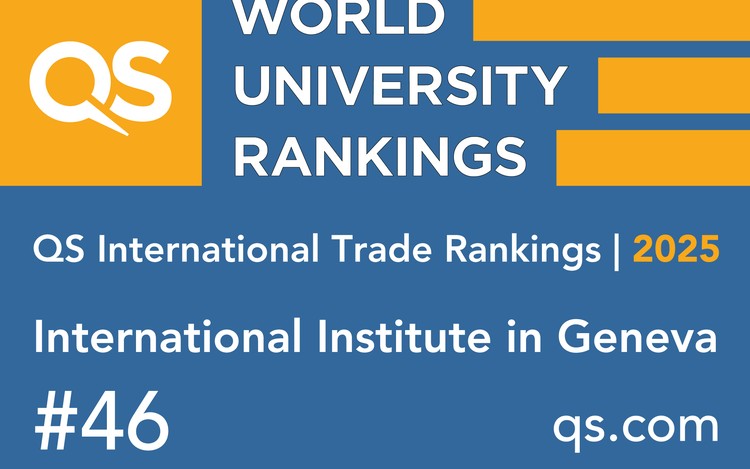Course Descriptions
-
LAW 665 – Public International Law between Peace and War This course will cover the concept of war in international law. Specifically, it is divided into two parts. The first classes will provide an introduction to public international law for students of international relations. Its purpose is to acquaint students with the concepts and methods used in public international law. The second part will focus on the laws governing the use of force, the rules regulating warfare, as well as the law applicable in the post-conflict phase. Particular attention will be paid to the interplay between different branches of international law – notably international humanitarian law, human rights, use of force – as well as new challenges such as cyberwarfare and the use of drones.6.00
-
ECO 610 – Global Economics & Development This course aims to examine the working of a national economy and the critical role that businesses play in it. It provides insights into the workings of economic policy and the issues discussed in current policy debates. It studies business cycles and the impact of policies on short-term fluctuations. It then turns to the longer term by examining economic growth and its drivers. It studies development and the strategies pursued by successful developing countries. It analyses the Sustainable Development Goals and contributes to a better understanding of the need for multilateral and regional economic cooperation and national economic policies for sustainable development. The course provides an understanding of challenges confronting the global economic order, impacts of the trade and investment policies, the role of financial system and the regional market integration.6.00
-
POL 628 – International Security This graduate-level course provides a comprehensive examination of the current state of international security, from internationalized civil wars to nuclear crises. Through lectures, discussions and assignments, students will analyze the various strategies used to ensure security in a turbulent world. They will study the evolution of military technology, the changing nature of contemporary warfare, including the phenomenon of cyber warfare and the role of non-state actors. The course will also provide a thorough overview of current efforts to control the proliferation of nuclear weapons and the effectiveness of international arms control agreements. Finally, the course intends to broaden students’ perspectives on security issues enabling them to recognize the concept of “security” as a particularly complex and multifaceted one and develop critical thinking on security-related issues.6.00
-
POL 645 – Geopolitics This graduate course on Geopolitics will focus on how politics is shaped by geography. A geographical understanding of political issues is therefore at the heart of this course. Students will study the emergence of geopolitics and the controversial origins of the discipline due to its link with totalitarian regimes as well as the different schools of thought of geopolitics. The course will examine geopolitical challenges and opportunities in key regions, such as the Asia-Pacific, Middle East, Europe, Latin America, and Africa, with a focus on territorial disputes, resource competition, nationalism and identity politics. Geopolitical analysis will complement students’ understanding of global politics with a new appreciation for how geographical context shapes political life. Students will also develop their critical thinking on political geography.6.00
-
RES 700 A – Introduction to Research This module is designed to provide students a solid understanding of the research process with a foundation in research methods and techniques. It will introduce students to how to identify research questions, develop hypotheses, design research, and collect and analyze data. Students will also be introduced to different research designs, such as qualitative, quantitative, and mixed-methods approaches.6.00
-
POL 621 – Global Environmental Politics This course explores the intersection of environmental issues, global politics, and international relations. The course focuses on how environmental issues are addressed, negotiated, and governed by nation-states, international organizations, NGOs, and other stakeholders. Through the analysis of case studies, including climate change, ozone, oceans, biodiversity, forests or transboundary watercourses, students will examine the various approaches to global environmental governance, including multilateral environmental agreements, market-based instruments, and civil society engagement. At the end of the course, student will be able to articulate the interaction of environmental policy with other international regimes, such as the trade and investment regimes. They will be equipped with the knowledge to develop appropriate strategies and solutions to address global environmental challenges.6.00
-
POL 630 – Foreign Policy and Diplomacy: Theory and Practice How do decision makers influence international affairs? Who decides in foreign policy making? What are domestic and international constraints for governments, policy makers and diplomats? This course looks at foreign policy and diplomacy through the lens of grand strategy and statecraft. The course focuses on core concepts and tools to analyze foreign policy and international issues from the decision makers’ perspective. It examines how to assess past events, examine day-to-day political affairs and forecast their possible future developments. International crisis and issues are analyzed as an opportunity for problem-solving by using bilateral and multilateral diplomacy. The course reveals political decisions as strategic response to complex and fast-evolving day-to-day events. Students will learn how to define an issue, evaluate risk, prioritize options and take action.6.00
-
POL 640 – Democracy and Globalization The module offers a broad conceptual and interdisciplinary understanding of democracy and globalization and how they have evolved throughout both the long and the more recent history. Each of these phenomena is studied in terms of their historical roots, the principles on which they rely and their broader consequence – both positive and negative. An analysis is made of the complex interaction between globalization, the current patterns of capitalism and democracy, and the impacts of geopolitics on these processes. Developments that characterize the contemporary world are critically analyzed and assessed: democratic decay, populism, illiberal democracy, neo-nationalism, neoliberalism, financial capitalism, the relevance of nation-state, inequality. Students will acquire conceptual tools to understand deep causes and movers of several major trends and ongoing international and domestic political and economic debates. Students will apply these conceptual tools to grasp different national realities through case studies.6.00
-
POL 665 – Human Rights: Law and Politics In this course students will get familiar with the philosophical foundations, the history and evolution of Human Rights as well as the international and regional institutions where Human Rights are discussed and their practical implementation monitored. Students will study more in depth some specific legal cases in order to better understand the key issues at stake but also the actors and mechanisms involved in order to critically assess the positive contributions and difficulties of the human rights regime. Students will study the controversies over human rights and the role played by human rights discourse in international relations. In the end, students will be equipped with the tools to navigate the international law and politics of human rights.6.00
-
RES 700 B – Research planning and preparation This module is designed to help students to plan and prepare their research projects(Capstone) by developing a clear, concise research proposal with problem statement, key research questions, research methodology, literature review, proposed outcomes. The research proposal forms the ‘gateway’ to the research (Capstone project) itself and the aim is to ensure that students are well planned to implement their Capstone projects.6.00
-
RES 700 C – Research Thesis / Capstone All graduate students at the IIG are entitled to complete a research thesis. Master’s thesis provides an opportunity for students to engage in high-level research focusing on an area of specialization within their program. In their thesis students apply the knowledge they have acquired in the Research Module (Introduction to Research Methodology RES 100A) while exploring the topic of their choice.30.00




.PNG)









